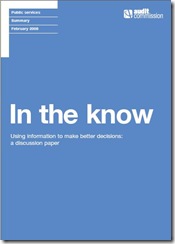If you don’t use it, you don’t need it
A specialist car engine tuner once observed that many of the road car engines that he was asked to tune for more power were obviously never used to their existing potential as certain bits in their innards were frozen shut from lack of use. These specialist services were very expensive. Clearly much of the expenditure on them is wasted.
 Management Information is also expensive, and much of the management information that is produced is also wasted. In 2008 the Audit Commission compiled a report relating to the use of information in decision making in the context of public services. The In the Know report contains many gems, but one is the observation that:
Management Information is also expensive, and much of the management information that is produced is also wasted. In 2008 the Audit Commission compiled a report relating to the use of information in decision making in the context of public services. The In the Know report contains many gems, but one is the observation that:
“…Information is expensive. …Speed, accuracy, completeness and sharing are all desirable for the users of information, but they all add to its cost. …no one can say how much money is wasted on collecting data or collating information that is not well used or not fully understood…."
And it isn’t just the expense of producing data. I once did some consulting work for a small charity that was, as it turned out, burning around £1500 a month just on staff time to read the “management information” that they were producing, quite apart from the cost of compilation.
There are, sadly, plenty of high-level examples of poor practice in this area. In 1981 Dame Edith Körner led a working group which recommended the datasets that should be collected and reported on by hospitals. Her recommendations were criticised at the time because there was little or no indication of who was expected to use these data and for what purpose. 28 years later this approach to management information still bedevils the NHS.
The key to avoiding this trap is to start with possible or actual management actions and activities and work back to the information needed to support those actions; but that is perhaps a blog post for another day…



Recent Comments